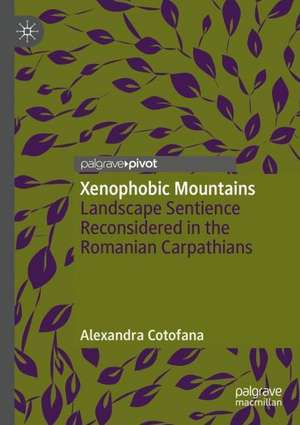Xenophobic Mountains: Landscape Sentience Reconsidered in the Romanian Carpathians
Autor Alexandra Cotofanaen Limba Engleză Hardback – 20 sep 2022
The novelty of this book lies in the fact that it is an in-depth analysis of an ontological world in which sentient landscapes are de-romanticized and presented in their uncomfortable complexity. The concept of sentient xenophobic mountains can add a great deal to the current literature on the ontological turn and ontological multiplicities, by questioning binaries like colonized/colonizer, indigenous/colonial, sentient landscape/industrial superpower. Romania’s history makes it a good case study for this exercise, as the country has been at the margins of empires, both desired because of its natural resources and rejected because of the perceived inferiority of its people, both racialized and racist, both neoliberal and imagining absolute sovereignty.
Preț: 351.66 lei
Nou
Puncte Express: 527
Preț estimativ în valută:
67.30€ • 70.00$ • 55.56£
67.30€ • 70.00$ • 55.56£
Carte tipărită la comandă
Livrare economică 14-28 aprilie
Preluare comenzi: 021 569.72.76
Specificații
ISBN-13: 9783031131110
ISBN-10: 3031131118
Pagini: 140
Ilustrații: XIII, 140 p. 41 illus.
Dimensiuni: 148 x 210 mm
Greutate: 0.34 kg
Ediția:1st ed. 2022
Editura: Springer International Publishing
Colecția Palgrave Macmillan
Locul publicării:Cham, Switzerland
ISBN-10: 3031131118
Pagini: 140
Ilustrații: XIII, 140 p. 41 illus.
Dimensiuni: 148 x 210 mm
Greutate: 0.34 kg
Ediția:1st ed. 2022
Editura: Springer International Publishing
Colecția Palgrave Macmillan
Locul publicării:Cham, Switzerland
Cuprins
Chapter 1: Introduction.- Chapter 2: National identity and the occult in late postsocialism.- Chapter 3: Literatures of sentience.- Chapter 4: Ethnographies of sentience.- Chapter 5: Carpathian omnipresence.- Chapter 6: Conclusion.
Notă biografică
Alexandra Cotofana is Assistant Professor in Anthropology at Zayed University in Abu Dhabi, UAE.
Textul de pe ultima copertă
This book, based on ethnographic research in Romania, traces the ontological red lines that form a world in which xenophobic landscapes are possible. The last couple hundred years in Romania’s history have been marked by change of political regimes, but this manuscript pays equal attention to an important continuity in Romania’s ontological world: its understanding of the landscape, and the relationship between Romanian people and their land. From political discourses to children’s books, to literature, and explanations found for everyday events, the book follows the ways in which the landscape of Romania has been understood as a sentient being imbued with willpower and ability to act on the world. The sentience specific to Romania’s landscape is characterized by xenophobia—a fear and distrust of ethno-religious others—that has been historically interpreted by Romanians as manifesting through acts of violence enacted by the landscape towards various groups of humans understood as dangerous to the country’s unity.
The novelty of this book lies in the fact that it is an in-depth analysis of an ontological world in which sentient landscapes are de-romanticized and presented in their uncomfortable complexity. The concept of sentient xenophobic mountains can add a great deal to the current literature on the ontological turn and ontological multiplicities, by questioning binaries like colonized/colonizer, indigenous/colonial, sentient landscape/industrial superpower. Romania’s history makes it a good case study for this exercise, as the country has been at the margins of empires, both desired because of its natural resources and rejected because of the perceived inferiority of its people, both racialized and racist, both neoliberal and imagining absolute sovereignty.
Caracteristici
Uses ethnographic research in Romania to trace the ontological red lines Adds a European ethnography to the body of work of the ontological turn Complicates the links between indigeneity and sentient landscapes
